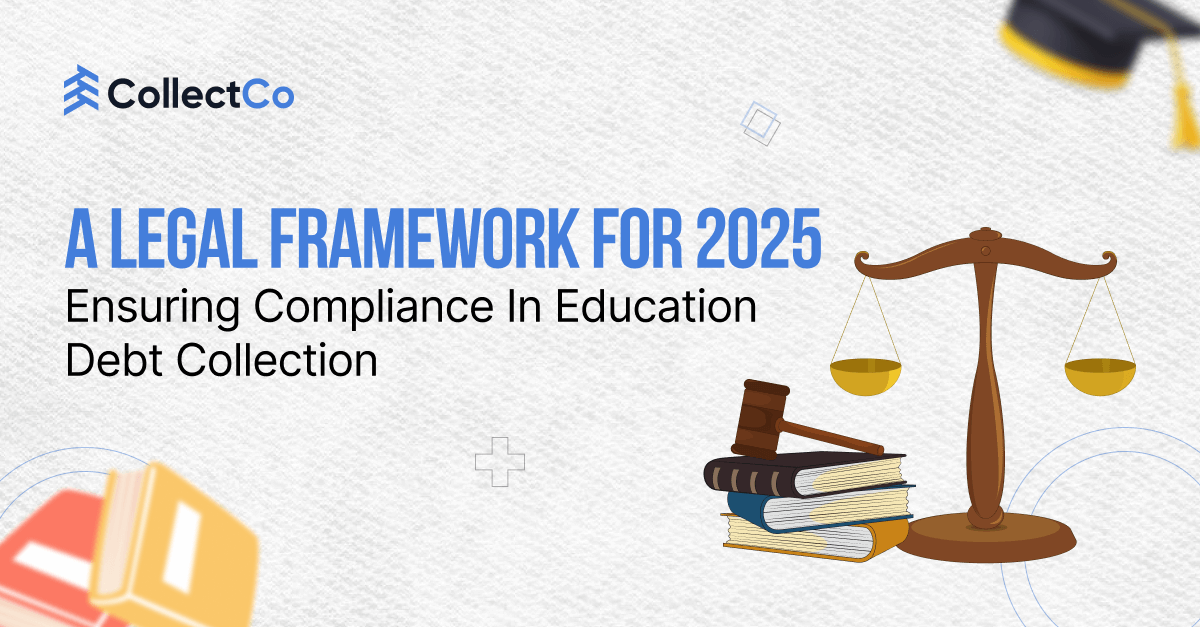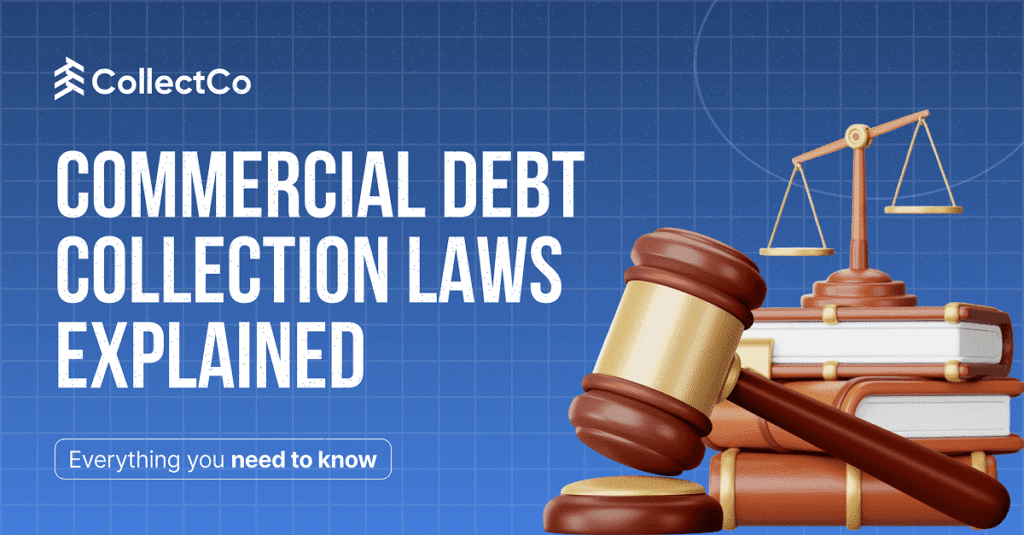
American schools are still reeling from the disastrous effects of the COVID-19 epidemic on their bottom lines. Colleges throughout the nation are still seeing severe revenue loss as a result of dipping enrollment rates, rising delinquencies, and increasing student debts.
Now that the federal loan payment has resumed after the pandemic-era pause, more than 9 million borrowers are projected to experience significant declines in their credit scores during the first half of 2025(1). These decreases are projected to be substantial, with estimates indicating drops of up to 171 points for borrowers with higher initial credit scores.
Despite all the listed roadblocks that are affecting the financial health of educational institutes, student debt collection remains the greatest obstacle. So, when it comes to ethical education debt recovery procedures, colleges must wholly follow all federal and state laws that are meant to safeguard student rights.
There are serious legal consequences and financial penalties that can arise from not following those rules.
In this comprehensive compliance and legal guide, we will examine some of the essential compliance frameworks and recommended practices for education debt collection, incorporating the latest regulatory developments from recent years.
Key Laws and Regulations Governing Student Debt Collection
FERPA Compliance When Recovering Student Debt
Private student information, such as grades and Social Security numbers, is safeguarded by the Family Educational Rights and Privacy Act (FERPA). That being said, it should automatically indicate how important it is to fully comply with FERPA.
In order to stay in the good books of the law, schools must take extra precautions when dealing with student data while collecting payments.
Recommended methods consist of:
- Eliminating personally identifiable information from data-gathering messages
- Ensuring that all collecting workers have thorough FERPA training
- Implementing strict protocols to prevent unauthorized information sharing
Learning About the FDCPA Consequences
To avoid indirect breaches, particularly when internal teams are involved in collection operations, educational institutions should be familiar with the requirements of the Fair Debt Collection Practices statute (FDCPA), even though the statute primarily oversees third-party collection firms.
What the FDCPA forbids is:
- Methods of abuse or harassment
- Defamatory claims
- False data-gathering methods
Being aware of these limitations aids institutions in upholding ethical standards and preventing harm to their reputation.
Navigating The Federal and State Laws
While federal restrictions provide a foundation, state laws may impose more stringent requirements. One example is the Rosenthal Fair Debt Collection Practices Act in California, which was amended in September 2024(2) to include certain business debts with amounts less than $500,000. Such shifts in federal or state laws show just how important it is for institutions to stay abreast of any legal changes.
Particularly for schools having campuses or students in more than one state, non-compliance with state regulations can result in penalties, legal disputes, and compliance examinations.
Collection Regulations; State by State
Changes at the state level are becoming more regular, and the compliance environment is changing at a rapid pace.
For instance, new regulations mandating registration and data submission were implemented by the California Department of Financial Protection and Innovation (DFPI) in October 2024(3).
It applies to:
- Companies that help with debt settlement
- Firms that help students get out of debt
- Loan providers for private higher education
- Companies that offer income-based loans
In order to stay in compliance, multi-state institutions should set up mechanisms to track when laws are updated and change their procedures appropriately.
Supervision of Third-Party Collection Agencies
Institutions are still liable even when they work with a third-party agency. It is the responsibility of educational institutions to monitor agencies to make sure they follow all applicable laws and ethical standards.
Here are some of the best practices:
- Performing thorough research before signing a contract
- Carrying out regular audits to ensure compliance
- Ensuring supervision to avoid vicarious liability
Legal action resulting from mistakes made by external partners can be avoided if institutions include agency supervision in their internal compliance program.
For more details on repayment options and rights, explore our introductory guide to education debt collection.
Looking for Ethical Third-Party Collections?
4 Best Compliance Practices for Educational Institutions
Critical Compliance Evaluation Form
Instead of viewing compliance as a discrete occurrence, institutions should view it as a continuous process.
To ensure compliance, a collection strategy should contain the following:
- Ongoing assessments to identify and reduce hazards
- Complete record-keeping of all student monetary transactions
- Training that never ends to keep employees abreast of ever-changing rules
- Clear policies that are in line with what is required by law
The effectiveness of long-term compliance is enhanced by incorporating these measures into routine operations.
Important Documentations Required
In the event of an audit or disagreement, documentation may serve as both a defense and a guide.
It is imperative that organizations safely preserve:
- Financial contracts and enrollment agreements
- Detailed records of all student interactions
- Statements of account and payment records
These documents provide evidence of openness and consistency to counter any allegations of wrongdoing or unfair treatment.
Managing Consent of Students
Ethical and legally compliant debt collection relies heavily on student consent. Institutions should make sure the consent procedure is clear and recorded in addition to obtaining an agreement.
Recommended methods consist of:
- Making use of permission forms that have been through the legal system
- Explaining all policies and procedures
- Keeping all legally binding documents in an easily accessible location
Building trust with students and safeguarding institutions from potential legal scrutiny go hand in hand.
Compliant Approach to Audit Preparation
Having everything set up before auditors show up is what we mean when we say we’re audit-ready.
Taking the initiative entails:
- Internal review procedures that are structured
- Requesting evaluations from outside parties
- Recording steps to fix the problem together with specific due dates
In addition to lowering the stakes, being well-prepared increases the trust that regulators and partners have in the institution.
Mitigating Legal Risks in Student Debt Collection
Assessing Possible Legal Liability
Serious consequences may result from failing to comply. The National Collegiate Student Loan Trusts were threatened with fines of about $2.25 million by the Consumer Financial Protection Bureau (CFPB)(4) in March 2024 for pursuing a lawsuit without adequate legal documentation.
Such activities demonstrate how irresponsibility may lead to monetary and reputational losses.
Methods for Avoiding Legal Conflict
Building a culture of openness and responsibility inside organizations might help them avoid legal trouble:
- Make all financial responsibilities known
- Dispute resolution mechanisms should be easily available and quick to respond
- Keep all interactions civil and avoid being hostile
- Document every encounter and attempt for payment in detail
This proactive approach aims to achieve Improved student satisfaction and resolution rates, which also helps prevent any legal troubles or lawsuits.
Protections for FERPA Compliance
Intentional or unintentional mistakes made by third parties are the most common causes of FERPA breaches. Get around these problems by making sure:
- Basic FERPA training is provided to all employees
- Partners and vendors follow FERPA guidelines
- No personally identifiable information is divulged in notices of invoicing or proceedings
Reducing institutional liability and reinforcing student privacy rights are both achieved by a uniform FERPA policy.
Looking for FERPA-Compliant Collections?
Ensuring Data Security During Collection
Protecting private student information is of the utmost importance in light of the growing prevalence of digital gathering methods.
Important procedures involve:
- Encrypting data sent via email and files
- Paying and communicating through protected gateways
- Verifying adherence to relevant privacy regulations, such as GLBA or CCPA
- Data breaches and regulatory action could ensue from a lack of fundamental cybersecurity precautions
Ethical Considerations in Student Debt Collection
Maintaining an Ethical Approach to Debt Recovery
Complying does not need sacrificing empathy. Supporting students while recovering cash should be the goal of all institutions.
What is included in ethical collections?
- Recognizing that students may face financial difficulties
- Providing adaptable payment options
- Speaking in a way that is kind and not aggressive
Improving engagement and recovery results over the long term is the goal of this student-first approach.
Realizing the Consequences of Filing for Bankruptcy
In some cases, a bankruptcy discharge will not wipe off debts held by institutions. A more sophisticated approach to undue hardship allegations was stressed in the 2024 guidelines from the Department of Education and the Department of Justice, indicating a change in the way courts may evaluate financial hardship, regardless of whether it is directly related to federal student loans or not.
Organizations ought to:
- Know when to expect a halt or change in collection attempts due to bankruptcy filings
- Manage all aspects of the student’s experience with care and compliance
- Be prepared to provide accurate documentation if legal action arises
Institutions can avoid needless legal complications and behave in good faith if they understand how bankruptcy law intersects with student debt.
How CollectCo Supports Compliance-Driven, Student-Centered Recovery
As we now know, compliance in the education sector is a core requirement for any institution managing student debt. With the increasing complexity of federal and state laws, ethical recovery now demands more than just persistence. Schools must combine operational discipline with transparency, empathy, and legal awareness.
That’s where CollectCo comes in.
CollectCo equips educational institutions with the tools and framework needed to navigate the modern collection process with confidence and care. Here’s how:
- Built-in Compliance: Stay aligned with evolving federal and state regulations, including FERPA, FDCPA, and state-specific mandates
- Secure, FERPA-Compliant Communication: Protect student privacy at every touchpoint with encrypted messaging and clear consent protocols
- Audit-Ready Documentation: Maintain complete, accurate records of student interactions, payments, and collection efforts – ready for any audit or legal review
- Student-Centric Recovery: Foster positive engagement through respectful outreach, flexible repayment options, and accessible portals that empower students
With CollectCo, schools can improve recovery rates without compromising compliance or student trust.
Sources
- https://libertystreeteconomics.newyorkfed.org/2025/03/student-loan-balance-and-repayment-trends-since-the-pandemic-disruption/
- https://www.consumerfinancialserviceslawmonitor.com/2024/09/california-enacts-new-debt-collection-legislation
- https://dfpi.ca.gov/wp-content/uploads/2024/10/Order-Final-Text.pdf
- https://www.consumerfinance.gov/about-us/newsroom/cfpb-takes-action-to-address-illegal-debt-collection-practices-by-the-national-collegiate-student-loan-trusts






